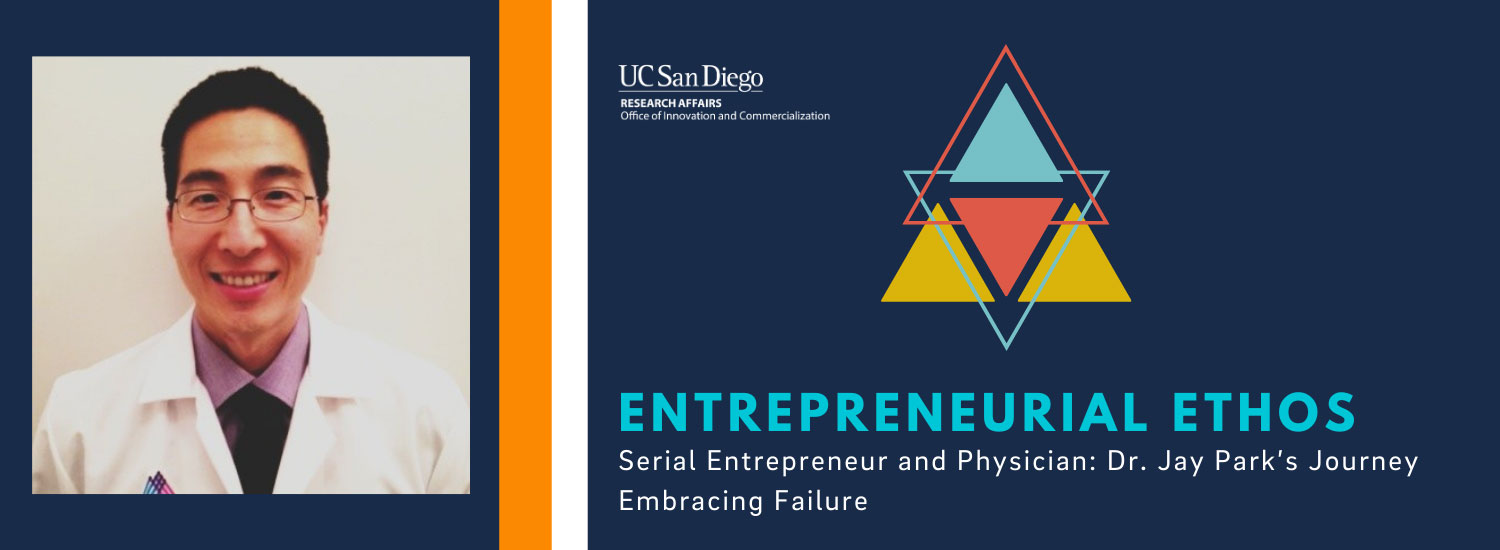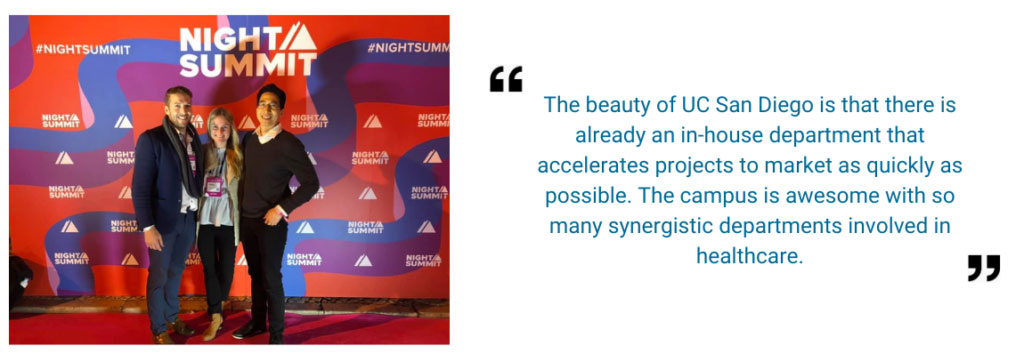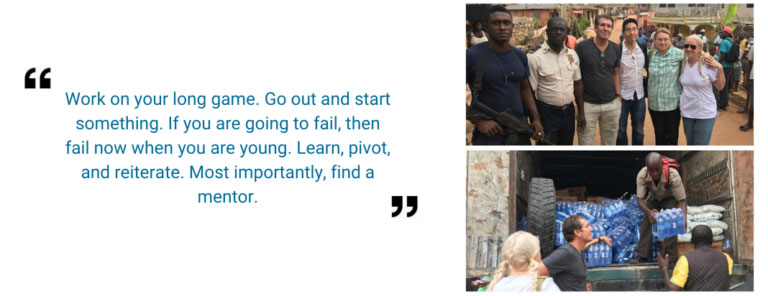
Serial Entrepreneur and Physician: Dr. Jay Park’s Journey Embracing Failure
May 4, 2021
Four active companies today. Over 20 projects and startups, most of them ending in failure. Co-founding at least one new startup per year, Dr. Jay Park’s hobby and passion is entrepreneurship. He is the co-Founder of MVP-Startup.com which provides tangible work and support to early startup companies.
During the pandemic, he co-founded PPE Connector, an open marketplace for trusted suppliers and qualified buyers of PPE to decrease price gouging and increase transparency. He personally vetted millions of PPE that went to all 50 states. This year, he's working on a brand-new marketing tech startup with a major pharmaceutical company, while celebrating his first major funding for his 2019 startup, Rente.ai.
Learn more about his entrepreneurial journey below, from a film major at UC San Diego’s Thurgood Marshall College to his current residency as an Entrepreneur-in-Residence and a future UC San Diego medical center physician.
Why did you become an entrepreneur after your medical education?
From an early age, I was very interested in fixing things or solving problems. It's a long story of how a UC San Diego film major ended up in medical school. My full-time job is in startups, but I still work part-time in emergency medicine. Disaster medicine is another passion of mine. I had the misfortune of working at Beth Israel Medical Center in NYC on 9/11, which sparked my interest in disaster medicine.
I’ve volunteered for Hurricane Katrina, Hurricane Sandy, the Haiti earthquake and most recently in Greece with the Syrian refugees crisis. I didn't suffer from medicine burnout, but I just didn't want the traditional medical career path.
In your role as a board-certified emergency medicine physician (and UC San Diego alumnus!), what has the last year taught you about the role that universities play in developing and deploying health interventions?
UC San Diego plays a vital role in health care innovation since many academic physicians have an interest in teaching and research. In academics, physicians are better positioned to address a problem and figure out a path to a solution due to the support of the institution. In community medicine, a physician does not have easy access to benefits like grants, multi-disciplinary departments or the Office of Innovation and Commercialization. Places like UC San Diego are a hub for interdisciplinary innovation.
What are some of the biggest challenges to being an entrepreneur in medicine? How can UC San Diego play a role in the solution?
It is commonly said that health care innovation is difficult. Having worked on many medical devices and health-tech startups, two questions commonly come up: Is the solution backed by evidence-based medicine, and does it save money? A health-tech startup needs to show evidence of its effectiveness to raise capital, obtain regulatory clearance and secure insurance reimbursement. This is typically a long road that for me has led to a few disappointments.

The beauty of UC San Diego is that there is already an in-house department that accelerates projects to market as quickly as possible. The campus is awesome with so many synergistic departments involved in healthcare, such as the engineering department through GEM, Galvanizing Medicine in Engineering. Health-tech at UC San Diego tends to be tilted heavier towards biotech or medical devices. I would love to see more cooperative entrepreneurship work from other departments like visual arts, linguistics or music within healthcare.
You recently moved to San Diego from the east coast (and abroad), could you compare the innovation ecosystems and what drew you to UC San Diego?
It’s great to be back in San Diego. I grew up here and the weather is amazing. I just spent three years in Poland. It is very cold there, but I actually got to surf a few times in the Baltic sea. The startup community is very much in its infancy in Eastern Europe. There is still a mix of the power brokers who grew up under communism and the youth who are ambitious and idealistic.
Before that I was living in NYC where the startup community is thriving. Networking and resources for a startup in NYC are abundant. Every night, you could find a bar hosting a meetup where you could pitch your startup to an audience for feedback. Having arrived in San Diego during the pandemic, I can't say very much about the startup scene here, yet.
Recognizing and celebrating student innovation are key parts of the campus ecosystem. What experiences are most important for inspiring the next generation of entrepreneurs?
Many people idealize unicorns like Mark Zuckerberg. The odds are that your startup is not going to be a unicorn. So, look for inspiration from those who have failed repeatedly, but persisted, like Thomas Edison, Henry Ford, Bill Gates or Mark Cuban. Patience, tenacity and resilience are the key to success in business, relationships and life. So, stop spending your time and your mental energy playing the lottery on Coinbase or Robinhood.

Work on your long game. Go out and start something. If you are going to fail, then fail now when you are young. Learn, pivot and reiterate. Most importantly, find a mentor.
Describe the most valuable lesson gained from a mentor in your journey - how has it continued to guide you today?
All of these pointers are from other mentors. COPE - Clarity, Offer, Practice, Execute. This is about marketing. Clarity, because if you can't tell me why I should buy your product in seven or fewer words, then it's too long. Offer, because it is the offer that closes the deal. Practice, because an athlete gets better after practicing. The same applies to your sales call or your elevator pitch. Execute, because many people think that a startup is like the film "Field of Dreams". If you build it, they will come. No way. You must have a strategy and execute it daily.
LEADD - Listen, Encourage Advise, Develop, do this Daily. This is about managing employees. Finally, if you are the smartest person in the room, then you are in the wrong room. A startup team is about a group of founders whose expertise complements each other so that there are no weaknesses. Also, I want to be in a room with other experts and leaders and have them tell me what I'm doing wrong!
What interested you in sharing your passion as an Entrepreneur in Residence at UC San Diego?
My hobby is starting new companies! I love teaching, mentoring, and helping others succeed. I love being entrenched in startup and university communities. Joining a community and networking is vital to a startup founder. I can't tell you how many times I failed during my early startup days, because I didn't seek advice or join a community.
Over 15 years, I've worked on over 20 projects or startups, with around a 75% failure rate. I enjoy telling people how not to fail because I've gotten pretty good at failing.

The beauty of the Entrepreneur in Residence program is this: I can help others go from idea to MVP without making my mistakes. It sucks when you fail for the first time. You feel depressed and ashamed. But this is where the startup community helps. Chances are that you'll be in a community with other seasoned failures. By the way, it still sucks when you fail for the 20th time. But now, I don't get depressed or feel any shame about it. My wife is amazing. She puts up with my startup ADHD. Having a loving partner is key!
To learn more about MVP Startup, go to MVP-Startup.com
To contact Jay, please email jp006@ucsd.edu